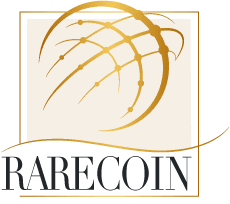Importance of a coin collection
If you are a gold coin collector, you may have already thought about what to do with your gold coin collection after you die. The decision can be a difficult task, as personal preferences, family dynamics and financial implications must be considered. However, with careful planning and communication, you can ensure that the collection is handled in a manner that reflects your wishes and values.
The first step in making this decision is to determine the value and significance of the coin collection . Is it a valuable family heirloom with sentimental value or a valuable investment that could provide financial security for loved ones? Knowing the value of the coin collection helps in the decision making process and ensures that the course of action chosen is consistent with one’s goals.
Next, it is important to let your loved ones know your wishes, especially if there are family members who may have an emotional or financial interest in the coin collection. Open and honest communication can help avoid misunderstandings and conflicts after the fact. Some ways to communicate one’s wishes include discussing the coin collection at family gatherings, writing a letter or a will outlining one’s wishes.
Once the value of the coin collection and the family’s preferences are known, it is time to consider various options for what to do with the collection. Some possibilities could be:
Passing on the collection to family members:
If the collection has sentimental value or is a family heirloom, passing it on to loved ones may be the best option. This can help keep the collection in the family and create a sense of connection with previous generations. It is important to discuss with family members who will inherit the coin collection and whether they have the means to care for it and keep it safe.
Selling the collection: If the coin collection is valuable, selling it can be an attractive option. This could provide a financial benefit to family members or allow for charitable donations. It is important to know the value of the coin collection and consult a financial advisor to ensure that selling it is the best option.
Ultimately, deciding what to do with a gold coin collection after someone’s death is a deeply personal matter that requires careful consideration and planning. By assessing the value and importance of the collection, communicating your wishes to loved ones, and considering various options, you can ensure that the collection is handled in a way that meets your values and goals.
Keeping records of your gold coin collection
Keeping records of your gold coin collection is critical for your heirs. It is important to keep track of the coins in your collection to ensure that they are distributed according to your wishes after your passing or that heirs, especially if they are laymen, know the value of your coin collection. Here are some of the reasons why record keeping is important:
Legal requirements
Record keeping is essential for legal reasons. In most cases, the distribution of assets, including gold coins, is governed by a will. This determines how the assets are to be distributed after the person’s death. Detailed records of your gold coin collection will ensure that your wishes are followed and that your heirs receive the coins you intended for them.
Monetary value
Gold coins can be a valuable asset, and their value can increase over time. If you don’t keep accurate records of your collection, it can be difficult to determine its monetary value. This may result in your heirs undervaluing the collection or not receiving the full value of the coins when they are sold.
Historical significance
Gold coins can be of historical significance, and keeping a record of your coin collection can help preserve that history. You can also provide your heirs with valuable information about the origin and value of the coins, which will help them sell or appraise the collection.
Personal heritage
Your gold coin collection can be an important part of your personal legacy. Keeping detailed records of your collection can ensure that your heirs know the importance of the collection and can pass that knowledge on to future generations.
Planning for the future
Keeping accurate records can help you plan for the future. This will help you determine if you need to make changes to your collection, for example, if you want to sell it or expand it.
Handwritten or digital?
Record keeping is an essential aspect of owning a valuable gold coin collection, as it helps keep track of the coins, their condition, and their value. Your inventory system should ideally be self-explanatory, as you may not be present in case the heirs have questions. Avoid abbreviations, personal codes or technical terms that may be familiar to you but not to your heirs. There are two main methods of record retention: digital and handwritten.
Digital records:
Digital storage uses technology to create and store records of your gold coin collection. This method has the advantage of being easily searchable and accessible from any location with an Internet connection.
Some possible steps to consider when digitally archiving are:
Choose an appropriate platform: you can use spreadsheet software such as Microsoft Excel or Google Sheets to create a database for your gold coins.
Organize your data: Create columns for each piece of information you want to capture, such as coin name, acquisition date, valuation, and current value.
Capture photos: You can add a column where you capture photos of each coin to help identify them.
Update regularly: Update your records when you buy or sell a coin or when its condition or value changes. For example, if you have your coin graded by PCGS or NGC after purchase.
Handwritten notes:
Handwritten record keeping involves manually recording information about your gold coin collection using a pen and pad of paper. While this method is not as convenient as digital recording, it is more tangible and allows for greater creativity in organizing your data. Some possible steps for the handwritten record could be:
Choose a notebook: choose a notebook that is sturdy and durable so your notes won’t get damaged or lost.
Create a format: Set a format for your recordings that suits your needs. You can organize your data by acquisition date, coin type, grading, theme, or any other criteria that is important to you.
Record details: write down the name of the coin, the date of purchase, the valuation, and any other information you want to include. You can also draw or attach photos to the coins for easier identification.
Location: Where is the coin collection located? A safe, a filing cabinet. If you have a lot of coins, you can describe the location in the safe and so on.
Special Notes: Is there anything else a heir should know about your coins?
Update regularly: Be sure to update your records regularly when you buy or sell coins or when their condition or value changes.
Whether you choose to record digitally or by hand, the key to effective record keeping is to be consistent and diligent. Keeping accurate and up-to-date records of your gold coin collection will help you better assess its value and make informed decisions when buying, selling, or passing on coins to another person in the future.
Do you have any questions about this topic? Then you are welcome to contact us.
Discover the new additions to our gold coin collection in the current range!
-
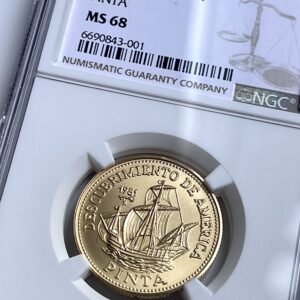
Cuba – 1981 – 100 Pesos – Pinta – NGC MS68
1.400,00 €plus shippingDelivery Time: approx. 2-3 days (excluding Saturdays, Sundays and public holidays) -
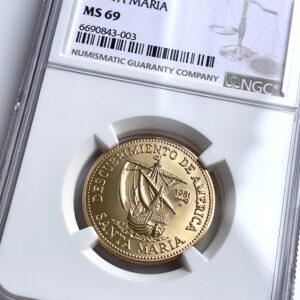
Cuba – 1981 – 100 Pesos – Santa Maria – NGC MS69
1.400,00 €plus shippingDelivery Time: approx. 2-3 days (excluding Saturdays, Sundays and public holidays) -
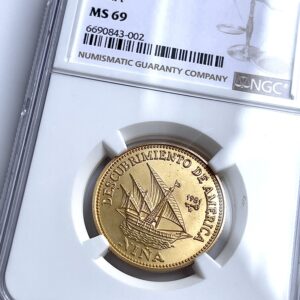
Cuba – 1981 – 100 Pesos – Nina – NGC MS69
1.400,00 €plus shippingDelivery Time: approx. 2-3 days (excluding Saturdays, Sundays and public holidays) -
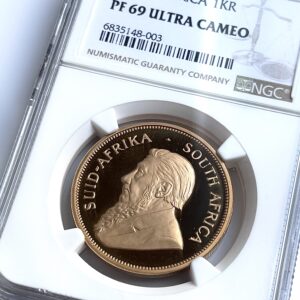
Krugerrand – 1993 – 1 oz Proof Gold Coin – NGC PF69 Ultra Cameo
3.300,00 €plus shippingDelivery Time: approx. 2-3 days (excluding Saturdays, Sundays and public holidays) -
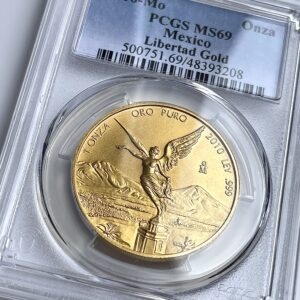
Mexico – 2010 – Libertad – Gold coin 1 oz – PCGS MS69
3.150,00 €plus shippingDelivery Time: approx. 2-3 days (excluding Saturdays, Sundays and public holidays) -
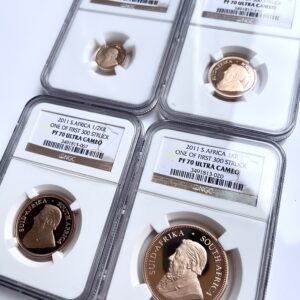
Krugerrand – 2011 – Set – One of First 300 – 4 Gold Coins Proof – NGC PF70 UCAM
5.500,00 €plus shippingDelivery Time: approx. 2-3 days (excluding Saturdays, Sundays and public holidays) -
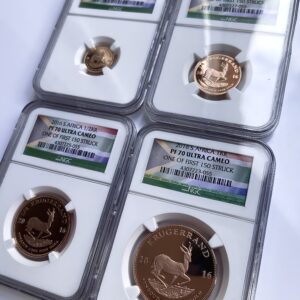
Krugerrand – 2016 – Set – One of First 150 – 4 Gold Coins Proof – NGC PF70 UCAM
5.500,00 €plus shippingDelivery Time: approx. 2-3 days (excluding Saturdays, Sundays and public holidays) -
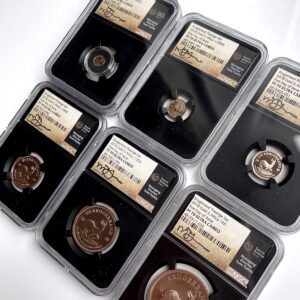
Krugerrand – 2018 – Set – First Day of Issue – 6 Gold Coins Proof – NGC PF70 UCAM
5.750,00 €plus shippingDelivery Time: approx. 2-3 days (excluding Saturdays, Sundays and public holidays) -
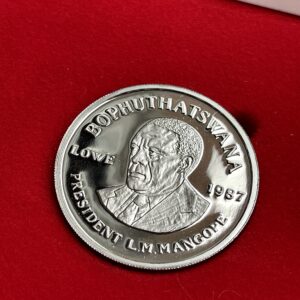
Bophuthatswana – 1987 – 10 years of independence – platinum – 1oz – with original case and certificate
2.195,00 €plus shippingDelivery Time: approx. 2-3 days (excluding Saturdays, Sundays and public holidays) -
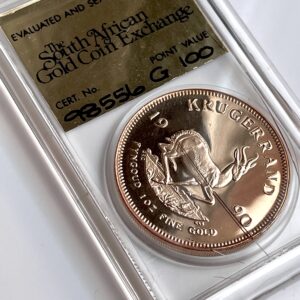
South Africa – Krugerrand – GRC – 1990 – SAGCE PoV 100 – 1oz Proof Gold
3.250,00 €plus shippingDelivery Time: approx. 2-3 days (excluding Saturdays, Sundays and public holidays)
